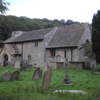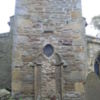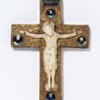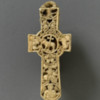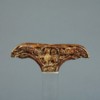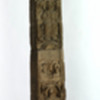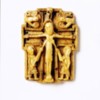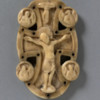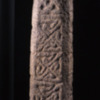Browse Items (29 total)
- Tags: Cross
Sort by:
St Hilda's Church, Ellerburn, North Yorkshire
St Hilda's Church is located in the village of Ellerburn in Rydale, North Yorkshire. The history of the church dates back to the Anglo-Saxon period. Built into the fabric of the present church are over thirteen early sculptural and architectural…
Tags: Archaeology, Architecture, Art history, Building, Church, Cross, Religion, Stonework
St Andrew's, Middleton, North Yorkshire
The church of St Andrew's at Middleton dates to the Anglo-Saxon period, and also preserves a considerable amount of Saxon architecture and Viking sculpturework. The bottom of the tower is part of the original Anglo-Saxon building, and the Saxon door…
Tags: Archaeology, Architecture, Art history, Building, Church, Cross, Religion, Stonework, Viking
The Colouring of the Ruthwell and Bewcastle Crosses
These notes describe a project carried out at the Manchester Museum in the University of Manchester as part of the redisplay of the museum galleries in 1999-2000, to recolour a set of casts of the crosses at Bewcastle and Ruthwell churches acquired…
Gold Reliquary Cross
2006BC6621_jpg_l and 2006BC6622_jpg_l. The cross is one of the rare surviving pieces which give substance to descriptions in contemporary documentary sources of the sumptuous church furnishings of pre-Conquest England. The enamels are unique in…
Tags: Archaeology, Art history, Cross, Inscription, Religion, V&A
Ivory Cross
The delicately carved archer on the lid of this cross probably represents a figure from the Old Testament: Ishmael, son of Abraham. The reverse shows the Lamb of God surrounded by the four symbols of the evangelists. The cross originally formed a…
Tags: Archaeology, Art history, Cross, Ivory, Religion, V&A
Ivory Tau Cross Head
2006AD1299_jpg_l. This is a head of an Anglo-Saxon tau cross in walrus ivory. The tau cross is a form of crozier head, named for its shape after the Greek letter T. The winged seraph is a reference to the vision of Isaiah in which singed seraphim…
Tags: Archaeology, Art history, Cross, Ivory, Religion, V&A
Easby Cross
2008BV1261_jpg_l. The monumental free standing cross was a phenomenon unique to the British Isles and Ireland, and this is one of the finest surviving examples. Carved with great skill, the decoration unites interlace patterns of the British Isles…
Tags: Archaeology, Art history, Cross, Religion, Stonework, V&A
Crucifixion Panel
2006AM6059_jpg_l. This panel representing the Crucifixion was probably made in the late 10th century or early 11th century in England. The representation of the Crucifixion with Longinus and Stephaton alone, without the Virgin and St. John, as on…
Tags: Archaeology, Art history, Cross, Ivory, Religion, V&A
Pectoral Cross
2009CA7155_jpg_l. Pectoral crosses were worn on a chain or cord around the neck, and acted as charms to protect the wearer. The pectoral cross was commonly worn by bishops and abbots in the medieval period. The figure style and the particular…
Tags: Archaeology, Art history, Cross, Ivory, Religion, V&A
Late Saxon Cross Shaft from Exeter
The granite shaft is decorated with simple interlaced patterns, broadly datable to the 10th or 11th centuries. It would formerly have been surmounted by a head in the form of a cross. Six such cross-shafts survive in Devon, the others being at…

